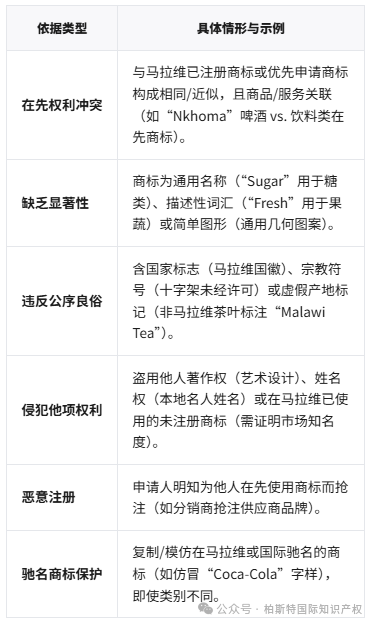- Knowledge
Preface:
The trademark opposition system in Malawi is the core legal barrier for rights holders to maintain prior rights and curb malicious registrations, and is managed by the Malawi Registrar General's Department (RGD). This system strictly follows the Malawi Trademarks Act (Cap. 49:01) and supporting rules, balancing procedural efficiency and substantive fairness. The following is a systematic analysis of the system from five dimensions:
1、 Trademark opposition acceptance agency
The Malawi Registration Authority (RGD) is the statutory regulatory body for objection procedures, under the jurisdiction of the Ministry of Justice, and has a Trademark Office for specific implementation. Its core functions include:
1. Review and Announcement:
Conduct formal examination (document compliance) and substantive examination (distinctiveness, conflict search) on trademark applications.
The trademark that has passed the examination is published in the Malawi Trademarks Journal.
2. Jurisdiction over Objection Cases:
Accept objection applications, review legal basis, organize evidence exchange, preside over hearings, and make administrative rulings.
3. Proxy mandatory requirements:
Foreign objectors must entrust a locally registered trademark agent in Malawi to submit the application.
Local enterprises can apply on their own, but it is recommended to entrust professional agents to cope with the complexity of the process.
Institutional Challenge:RGD resources are limited, with a backlog rate of about 30% in recent years, and the adjudication cycle is prone to be extended.
2、 Timing of Trademark Objection
The exercise of the right of objection is subject to strict time limits and cannot be restored
1. Announcement Launch:
After the trademark is reviewed, RGD will publish the trademark details (design, category, applicant, etc.) in the official magazine for a period of 60 days (calculated from the date of publication).
2. Objection window period:
The objector shall submit a formal Statement of Opposition within 60 days, accompanied by a statement of reasons and preliminary evidence.
3. Consequences of overdue:
No objections upon expiration: The trademark will be automatically registered.
Failure to raise objections beyond the deadline: The rights holder can only protect their rights through invalidation procedures (applying to RGD) or judicial litigation (filing a lawsuit with the Malawi High Court), which increases the cost by 3-5 times.
Monitoring suggestion:Enterprises need to subscribe to RGD trademark magazines or use international monitoring services (such as WIPO Madrid Monitor) to avoid missing deadlines.
3、 Basis for Trademark Objection Application
Objections must be based on the statutory grounds specified in Article 21 of the Malawi Trademark Law, with core grounds including:

Key points of evidence:The objector needs to submit a Malawi trademark registration certificate, sales invoice, advertising materials, market research report, etc., to prove the possibility of confusion or malice.
4、 Trademark opposition process
The objection procedure is divided into five stages, and the entire process is supervised by RGD:
1. Submit Objection Application (Month 0-2)
The objector shall submit an objection application (including legal reasons), a list of evidence, and pay official fees (approximately $50).
2. RGD Form Review (Month 2-3)
RGD shall review the integrity of the documents, and any omissions shall be corrected within 30 days, otherwise it shall be deemed withdrawn.
3. Respondent's defense (Month 3-5)
RGD notifies the objector to submit a counter statement and counter evidence within 60 days.
4. Controversy Refutation (Month 5-6)
The objector may submit supplementary evidence and legal opinions regarding the defense content (within a 30 day period).
5. Hearing and Adjudication (Month 7-24)
RGD reviews the case file and may hold a hearing (non mandatory) based on its authority, ultimately making a decision:
Objection established: The trademark application is rejected, and the objector may appeal to the Malawi High Court.
Objection not established: Upon approval of registration, the objector may file an administrative lawsuit with the Malawi High Court.
Relief mechanism:The losing party shall file a lawsuit with the High Court within 30 days after the award is served.
5、 Trademark opposition period
The average duration of the objection procedure is 18-24 months, with specific variables including:
1. Standard process duration:
Announcement period (60 days) → Defense period (60 days) → Refutation period (30 days) → RGD ruling (12-18 months)
2. Extended cycle factors:
Overseas evidence needs to be authenticated (Hague authentication or Malawi consular authentication), with an additional 1-3 months;
RGD hearing schedule delay (due to traffic disruptions during the rainy season affecting office efficiency);
Both parties apply for a procedural extension (usually allowed once, ≤ 60 days).
Judicial appeal stageIf entering the High Court for litigation, an additional 2-3 years will be added.
Institutional challenges:
1. Fuzzy review criteria:RGD has a strong subjectivity in judging "product relevance", leading to inconsistent rulings in similar cases.
2. High threshold for evidence:Unregistered trademark claims require evidence of continued use in the Malawi market (such as sales records of more than 3 years).
Practical Strategies and Institutional Evolution
Although the objection system in Malawi provides a pathway for rights relief, procedural delays and judicial costs remain the core pain points. Enterprises should proactively adopt the following strategies:
1. Pre registration:Submit an application before entering the Malawi market, using the Paris Convention priority (6 months) or designating Malawi through the ARIPO system (African Regional Intellectual Property Organization).
2. Localized evidence:Retain customs declaration forms, local sales contracts, newspaper advertisements, etc. for the Malawi market, and establish a complete chain of evidence for their use.
3. Priority for reconciliation:A Coexistence Agreement can be negotiated before the RGD ruling, saving over 70% of the cost of safeguarding rights.
With Malawi's accession to the Madrid Protocol and deepening cooperation with the EU on the IPKEY project, RGD is advancing the construction of an electronic application system, which is expected to improve the efficiency of the objection process in the future.




